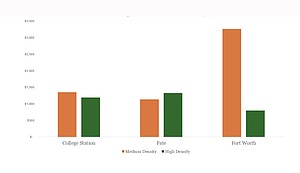5/8/2025

As Texas continues to grow by more than 1,500 new residents each day, a groundbreaking study from Texas 2036 and the University of Texas at Austin School of Architecture offers a fresh perspective on how cities can manage that growth without breaking the bank. The report, “Fiscal Implications of Urban Density,” reveals that cities embracing medium- and high-density housing developments—such as townhomes, small apartment complexes, and multifamily units—can generate significantly more revenue while spending less on infrastructure maintenance than traditional suburban sprawl.
Analyzing nine recent residential developments in Fort Worth, College Station, and Fate, the study found that denser developments not only better support long-term city budgets, but also boost fiscal productivity by more than $3,000 per housing unit in certain cases. These findings arrive at a pivotal moment as Texas legislators and city leaders debate how to address the state’s growing housing affordability crisis.
A Fiscal Wake-Up Call for Texas Cities
Dr. Jake Wegmann, associate professor at the UT Austin School of Architecture and the study’s lead author, emphasizes that denser developments don’t just make better use of space—they create stronger fiscal futures for Texas cities.
 Dr. Jake Wegmann, associate professor at UT Austin School of Architecture
Dr. Jake Wegmann, associate professor at UT Austin School of Architecture “When cities opt for compact growth, they’re not just accommodating more people—they’re also creating more financial breathing room,” said Dr. Wegmann.
The study outlines how compact housing developments generate more property tax revenue per acre while requiring far less long-term investment in roads, water lines, and sewer systems. For sprawling subdivisions, the maintenance and replacement of infrastructure can consume up to 60% of a city’s added fiscal burden, making them costlier in the long haul.
Real Data for Real Decisions
This research provides more than just insight—it offers actionable tools. City planners, developers, and policymakers can access the transparent and replicable fiscal impact model used in the study at www.texas2036.org/housing, enabling them to evaluate the financial implications of different development strategies in their own communities.
Emily Dove, policy advisor at Texas 2036, underscores the study’s value in equipping city leaders with the data they need to make sustainable, cost-effective decisions:
 Emily Dove, policy advisor at Texas 2036
Emily Dove, policy advisor at Texas 2036“Texas communities are facing tough choices around affordability, growth, and infrastructure. This study helps ensure those choices are grounded in real-world financial data.”
A Path to Affordable, Sustainable Growth
As cities across the Lone Star State—from Houston to Fort Worth to the Rio Grande Valley—grapple with surging populations, this study provides a compelling roadmap for how smart urban planning can balance growth with fiscal responsibility. Compact development doesn’t just offer housing solutions; it empowers cities to build vibrant, well-funded communities where every dollar works harder.
Supported by Wells Fargo and Texas REALTORS®, the research reinforces the notion that sustainable, higher-density neighborhoods aren’t just a trend—they’re a financially sound strategy for the future of Texas.
About Texas 2036
Texas 2036 is a nonpartisan public policy nonprofit focused on using data-driven strategies to ensure Texas remains prosperous as it approaches its bicentennial. From education and health care to infrastructure and the economy, Texas 2036 provides actionable insights to address the state’s most pressing challenges.
About the UT Austin School of Architecture
The University of Texas at Austin’s School of Architecture is nationally recognized for its excellence in education, research, and community impact. Through its Center for Sustainable Development, the school leads research on urban design, planning, and sustainability, equipping students and cities alike to build a better future.
